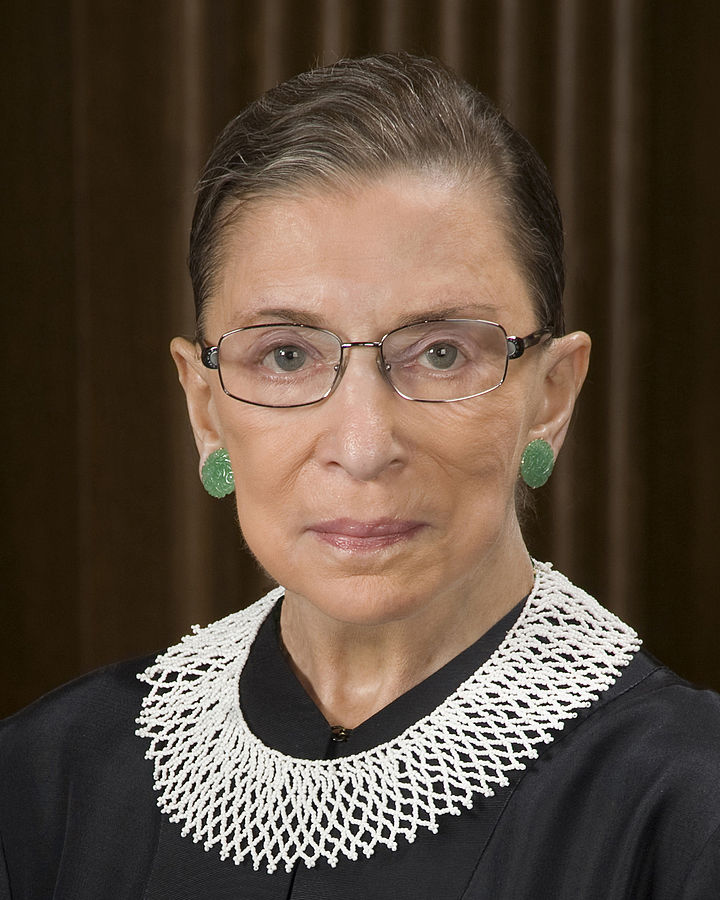Ruth Bader Ginsburg Should Not Be Glorified
October 8, 2020
On September 18th, 2020, Supreme Court Justice Ruth Bader Ginsburg passed away due to complications from her metastatic pancreatic cancer. RBG is well known for being a champion of women’s rights and many times used her vote to protect and advocate for equity in the United States. However, some of her actions and rulings in court did not always reflect the ideals that she became almost revered for by left-leaning people across the country, and when reflecting on her character, it is important to not only sing her praise but to acknowledge her shortcomings.
RBG’s hand in reinforcing women’s rights under the Constitution gave her the status as a feminist icon, especially for those who were not only alive for her time serving as a Supreme Court Justice but also for her time with the American Civil Liberties Union (ACLU) as the director of the Women’s Rights Project. Ginsburg began her battle against gender-based discrimination long before she was behind the bench as a Supreme Court Justice; in Reed v. Reed, the Equal Protection Clause of the 14th Amendment was used to prevent discrimination due to someone’s gender for the first time, setting a precedent that can be used in future cases. One of the more famous cases that RBG wrote the majority opinion for, United States v. Virginia, used the same argument and solidified that gender equality is a right protected under the Constitution. RBG also had a hand in helping with cases of unequal pay, because although Ledbetter lost Ledbetter v. Goodyear Tire & Rubber Co., Ginsburg’s dissent led President Obama to sign the Lily Ledbetter Fair Pay Act
Additionally, she is widely known for having voted to protect women’s access to safe abortions and to make gay marriage federally legal. Both of these things, but particularly abortion, continue to be hotly debated everywhere in the country, and with her passing, many people’s rights and protections are at risk. Ginsburg’s career and past rulings make it clear that if an attack on these rights were to occur, her stance would most likely be to vote in favor of protecting them. As many people mourn her death, they are mourning her not only as a person but as a wall of defense, especially as the country waits to see if the Senate will confirm President Trump’s nominee for the new Supreme Court Justice. If he is allowed to do so, the Supreme Court will undoubtedly move further right. There is no denying that Ruth Bader Ginsburg was a very important person who left a huge impact on America due to her staunch defense of women’s rights. However, RBG is not perfect and she should not be treated as if that is the case.
In 2016, Colin Kaepernick started to kneel for the national anthem as a protest against police brutality and the systemic oppression of black Americans. The last few months have seen escalated protests for the same cause, sparked by the death of George Floyd. When asked about Kaepernick’s actions, Ginsburg said that it was “dumb and disrespectful,” “ridiculous,” and a “terrible thing to do.” She takes no issue with the legality of the act, but she is clearly personally against people doing it. RBG called the protestors “stupid” and “arrogant,” and said that she “strongly take[s] issue with the point of view that they are expressing when they [take a knee during the anthem].” For her to bash on people for protesting against the oppression of black people in America was shocking; she was seen as a champion of social equity, many people felt they could count on her to stick up for those in need. The protestors’ “point of view” was that they did not feel that they could display pride and respect to a country that’s system works against them, and the rampant racism that affects millions of people in the country. The fact that she has an “issue” with that is a blow to any woman of color who held her in high regard. Ginsburg’s failure to recognize the importance of the protests was the definition of white feminism
Additionally, her decision regarding the Mountain Valley and Atlantic Coast pipelines was a letdown. In this case, environmentalists were trying to stop the construction of these harmful pipelines on the grounds that the US Forest Service could not issue a permit to the companies building the pipelines since the Appalachian trail is under the jurisdiction of the National Park Service, and a previous ruling had given precedent for this. There are important concerns when it comes to building the pipelines. The environmental cost is high; water, air, wildlife, and the forests themselves. We’ve already seen pipelines pollute water sources, putting animals at risk, and contaminating human drinking water. The compressors used to move gas along the pipelines emit toxic pollutants, along with the environmental dangers that fracking already poses. To build the pipelines, sections of three national forests will have to be clearcut; this severely impacts the ecosystems in those areas by destroying habitat for wildlife, destroying the biodiversity in those areas, eroding the land, putting water sources at risk, and undermining the area’s ability to soak up greenhouse gases and aid the fight against climate change. The pipeline would also disproportionally affect people of color, especially Native Americans and black people, and low-income communities. There is concern over the impact it would have on historical and cultural sites belonging to the Lumbee Tribe, and also the impact that a compressor station would have on Union Hill.
According to the article Ginsburg, Breyer Join Conservatives in Supreme Court Decision to Clear Appalachian Trail pipeline, the majority ruling in this case overturned a decision that a lower court made blocking the US Forest Service from granting the permit because as Justice Clarence Thomas wrote, “the National Park Service did not transform the land over which the Trail passes into land within the National Park System.” Ruth Bader Ginsburg was part of the 7-2 majority. This case calls into question how much one should let morality influence the interpretation of the Constitution because one could argue that RBG was only considering the documents, not the consequences of building the pipelines. Injecting some personal beliefs into the interpretation of the law is necessary because of the nature of the document, and what’s more, it is already done. If every Justice looked at the Constitution objectively, we as citizens would not be concerned about how many Justices are conservative or liberal or how their beliefs will sway the direction the law takes. Therefore, Ginsburg’s decision in this case was disappointing whether she decided to ignore the consequences or didn’t care about them.
Like all humans, RBG was a three-dimensional person, but the “flaws” in her character have much more weight to them when they end up having a wide-scale impact on others. The impact she has on women’s rights in the United States will not be forgotten. However, it is important to remember her shortcomings to avoid putting her on a pedestal. It is dangerous to glorify others, especially those in politics because that is how people become dogmatic and blinded to their wrongdoings. If we all learn to look critically at even the people we support, we’ll be in a much better position moving forward.











































































































































